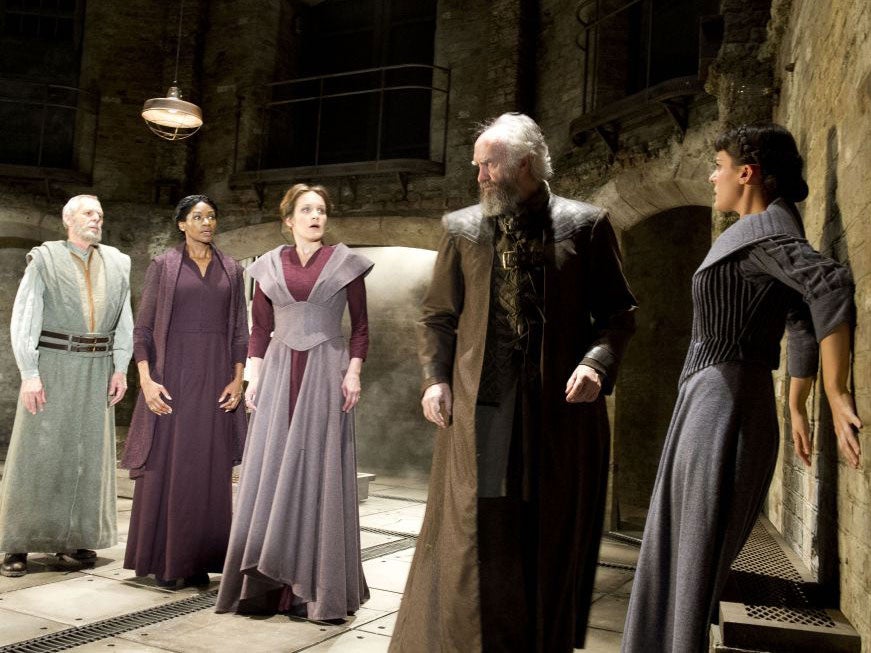More sinned against than sinning? Not this predatory King Lear
A Critical View: King Lear as a sex offender, new books straight through your letterbox and some nebulously defined art

The question of how many liberties you can take with Shakespeare is usually a matter of editorial fiddling or wild exercises of translocation. You less often encounter a controversial boldness of back-story. I did this week, in Michael Attenborough's consistently interesting and intriguing production of King Lear at the Almeida. What do you think about a King Lear who qualifies for the Sex Offenders Register?
As Jonathan Pryce plays the King there's no question that that's what's being hinted about his past relationship with his two oldest daughters. After Lear has cursed Goneril he seizes her and plants a kiss directly on her lips, an aggressive gesture of sexual possession. And, while you might pass that off as merely a spark of his incipient madness, there's no mistaking the implication when Lear rails at Regan, "Tis not in thee/ To grudge my pleasures". Pryce thrusts his groin lasciviously against his daughter as he denies her ability "to oppose the bolt/ Against my coming in". This King's sense of sovereign sway, you're meant to think, extends to every part of his daughter's bodies.
I think it would be something of a stretch to claim that the text licences such a reading, though the lines will (just about) bear the nuance that is applied to them. You might argue that the phallic "bolt" takes a defensive role not a penetrative one in this image, and that Shakespeare would have avoided the muddled mental picture it presents. But, equally, I don't think you could argue that there's anything in the text that categorically rules out the possibility that Lear sexually abused his daughters. The liberty is available to Pryce and Attenborough and they take it. You might equally suggest, I suppose, that Desdemona really is sexually tempted by Iago, because the moment you embody a text by putting it on stage you have the opportunity to say things with bodies and faces that aren't said by the lines.
The question of whether it's justified is a different matter, and it surely depends on whether the subversive reading causes more problems than it solves. The sex-abuser Lear isn't without its attendant difficulties, beyond its challenge to convention. It makes it quite tricky, for example, to feel the same way about Lear's final, heartbreaking scene with Cordelia. Did she escape a dreaded night-time visit because he just hadn't got around to her? And shouldn't some of our sympathies be diverted to her psychologically-damaged sisters, now dead? But, in Attenborough's production, this hint of past predation also does something very interesting. It nudges you towards the realisation that Regan and Goneril are both frightened of their father. Not just scornful or unfeeling or ungrateful. But physically frightened. And for this there is textual warrant. When Goneril questions the size of her father's retinue, for instance, she notes that it enables him to "enguard his dotage with their powers,/ And hold our lives in mercy".
I studied King Lear at A-level, wrote essays on it at university and have seen it numerous times. And yet until the other night I'd never really noticed that little tremor of fear in Goneril's speech, the sense that, in admitting her father to her house, she's admitting someone dangerous. But suddenly it glistened and caught the eye in the lurid – arguably perverse – light of Pryce's characterisation. The invention had pointed us back at the play, not away from it. This could be evidence of my obtuseness, of course, rather than the intelligence of the performance and production. But I think I'd prefer to give them the credit and, in this case, uphold their licence to take liberties.
Get the best new books, post-haste
As has already been noted, it's been a good Booker year for independent publishers, with three of the shortlist selections rewarding the judgement of very small houses. The most interesting of these – from a business point of view rather than a literary one – is And Other Stories, publisher of Swimming Home by Deborah Levy, which offers interested readers the opportunity to take out a subscription – not to a magazine or a single title, but to the editorial wisdom of the publisher's core team. You can't pick what you're sent. You just wait for a literary treat to drop through the letterbox. For £50 you get six books a year, which seems like a pretty good deal.
High art? Or pie in the sky?
The Cultural Olympiad officially finished last weekend, but I'm still looking forward to one of its headline events. Looking forward, though, with warily contained expectations. Anthony McCall's Column – one of 12 public art commissions called Artists Taking the Lead – is a proposal to erect a mile-high pillar of cloud over Merseyside. After problems with planning, air traffic clearance and technical details the mechanism for producing it was floated into place a few weeks ago, though it's still not performing as it should. Wisely, perhaps, Column now has no fixed launch date. I'm sure the Liverpool Biennial would be happy to adopt it as part of their festivities; but since that only runs until 25 November, they'll have to keep their fingers crossed.
Join our commenting forum
Join thought-provoking conversations, follow other Independent readers and see their replies
Comments
Bookmark popover
Removed from bookmarks